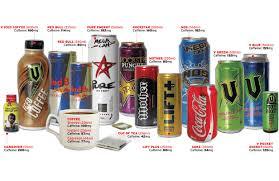Caffeine Update
March 06, 2018
Warnings Regarding Energy Drinks and Exercise

The American College of Sports Medicine (ACSM) has recently released a statement detailing the effects of energy drinks, with their guidelines for safe usage, and warnings for vulnerable populations, including children. When seeking a quick boost of energy pre-workout to beat thirst, or to just get a kick to aid alertness, people turn to energy drinks, as they are readily available and well marketed. However energy drinks, which are generally non-alcoholic beverages containing high levels of caffeine, and often higher levels of sugar, may not be the hydration and energy solution they may claim to be. Cases of major negative side effects have been attributed to energy drink consumption related to its high caffeine content, including alleged cases of death, and heart issues. There are potentially longer term side effects related to the high sugar content, and its link to dental decay, type 2 diabetes, and heart disease.
“Energy drinks are extremely popular and concerns about their consumption are coming from every sector of society, which is why we’ve published these recommendations.”
said John Higgins, MD, and Fellow of the American College of Sports Medicine (FACSM) about the ACSM guidelines.
“Our review of the available science showed that excessive levels of caffeine found in energy drinks can have adverse effects on cardiovascular, neurological, gastrointestinal, renal and endocrine systems, as well as psychiatric symptoms.”
Energy drinks are often used pre-exercise to aid performance, and after for recovery, however the use of these drinks to assist in exercise performance is likely to be misunderstood, with marketing claims being oversimplified. Any performance gains are likely to be swiftly lost, as caffeine also has diuretic properties, leading to dehydration. “When used safely and with moderation, energy drinks may have some short-term, performance-enhancing effects. However, users are generally unaware of the many potential adverse reactions that could have long-term effects, some of which are quite serious,” said Higgins. The use of supplementation and energy boosting products is at an all-time high, with superfoods, supplements and so called nutritional enhancers including energy drinks being readily available online and easily available in shops. However, a good marketing campaign does not always equate to a good result. For younger people, and those with health or medical concerns, what can be touted as a harmless helper can have unexpected side effects, and for the average consumer there may not be any real benefits. If it’s extra energy or an exercise advantage you are after, then a balanced diet, combined with rest and regular activity is the answer.
Other specific recommendations from the research suggest that energy drinks:
• should not be consumed by children or adolescents
• should not be consumed by other vulnerable populations, including pregnant or breastfeeding women, caffeine naïve or sensitive individuals or individuals with cardiovascular or medical conditions
• should not be used for sports hydration
• should not be mixed with alcohol
• should bear a label such as “High Source of Caffeine” or “Do Not Mix with Alcohol”
Reference: https://www.acsm.org/about-acsm/media-room/news-releases/2018/02/08/acsmannounces-new-recommendations-and-warnings-regarding-safety-of-energy-drinks
REPs Media release